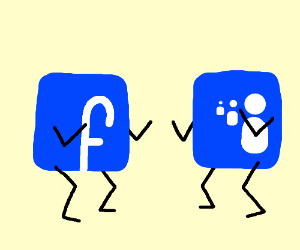Good/Bad Website Smackdown
With over 2 billion active users, Facebook is one of the most well-known social networking sites in the world. The ability of Facebook to connect people from all over the world is one of the reasons it is viewed highly. Users can build profiles, post videos and pictures, and connect with friends and family on the platform. Additionally, Facebook offers users a variety of services including groups, pages, and events that let them interact with people who have similar interests to their own.
MySpace, a social networking service that gained popularity in the early 2000s, is viewed badly for various reasons. Users found it challenging to navigate MySpace's complicated layout and locate the content they were looking for. It was also risky for users to share personal information on MySpace because of its reputation as a hub for spam and scammers. MySpace's loss in popularity was ultimately brought on by the fact that it took a while to adjust to changes in social networking patterns, such as the move toward mobile devices.
Amazon is another illustration of a fantastic website. Electronics, books, and apparel are just a few of the things that Amazon sells online. Amazon is regarded favorably in part due to its wide range of products. The user-friendly design of Amazon's website makes it simple for visitors to find what they're looking for. In addition, Amazon offers a number of options that help people make informed shopping decisions, like product reviews and suggestions.
A poorly designed e-commerce website, on the other hand, is a poor example of a website. When an e-commerce website is poorly designed, it might be challenging for visitors to find the things they're looking for. Additionally, a non-secure online store may put consumers' money and personal information in danger. Slow loading speeds are another sign of a terrible e-commerce site, driving customers away from their carts in frustration.


.jpg)
Hello Jessica, thank you for your 2.0 smackdown on Facebook and MySpace—another example of an outdated version of a product and an updated version.
ReplyDelete